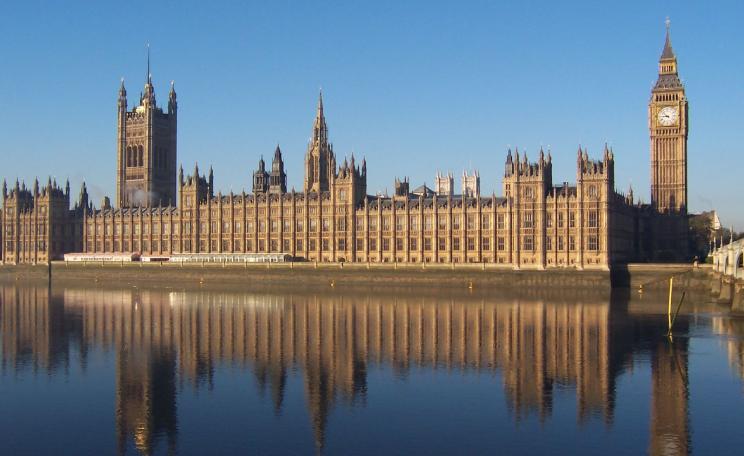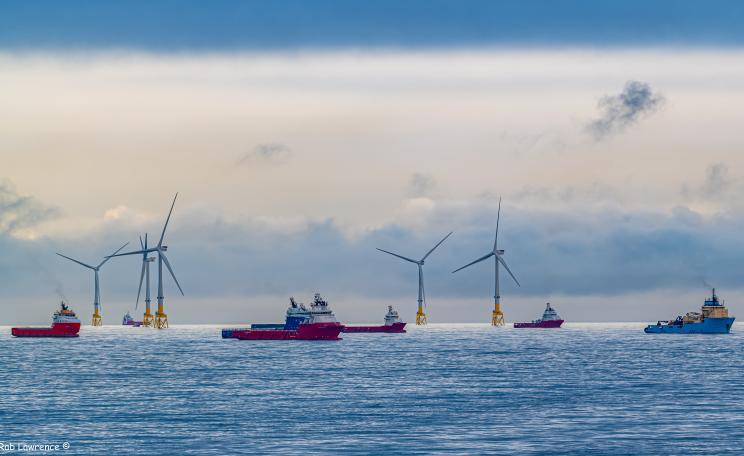This economic terrain offers a rare chance for the climate movement to broaden its message by confronting and overturning the prevailing narrative that fossil fuels are prima facie cheaper than renewable alternatives.
The Rosebank oil field is one of this government’s most dangerous policies. It is the UK’s biggest undeveloped oil and gas field: burning its contents would produce more than the combined annual emissions of 28 countries containing 700 million people. The flames would also be a pyre for British credibility in climate negotiations.
#StopRosebank – the campaign resisting the expansion – has already shown its strength by winning several postponements. But with the field officially approved on 27 September 2023, and with the wider climate movement eager for a common cause, the Rosebank campaign might well expand into a major chapter in that movement’s history.
Just hours after the Rosebank field’s approval, a crowd gathered outside Westminster’s Department for Energy Security and Net Zero, with a banner proclaiming ‘Rosebank will kill us’. A few days later, amid a chorus of online outcry, hundreds joined protests at both London and Edinburgh. One Scottish speaker warned: "This fight is far from over".
Brewing
These prompt responses were largely products of #StopRosebank, a network of NGOs, grassroots groups and individuals which initially formed around an effort to stop Cambo oilfield two years prior. The #StopCambo campaign succeeded within just six months; when plans for Rosebank field were first announced in 2022, the network re-formed to face this new threat.
#StopRosebank (SR) is an amorphous entity working at many levels, on the streets, among civil society and in the halls of power, so it’s not always clear where the group has been involved.
But there can be no doubt that its efforts were foundational to the broad opposition surrounding the approval, which included a petition with over 150,000 signatures, and public opposition from 400 faith leaders, 200 civic organisations, 40 MEPs, 50 MPs from every major political party.
This initial pushback has so far failed to reverse the field’s approval. But these efforts are likely just the start of something altogether bigger.
Collision
The UK climate movement at large has been on a collision course with North Sea oil since 2022. Emerging from lockdown and the previous strategic cycle which saw modest concessions from Westminster, prominent groups like Just Stop Oil, Extinction Rebellion, Greenpeace and Friends of the Earth rallied behind a new demand: no new oil and gas licenses.
This new direction was supported by a report from the International Energy Agency that meeting climate targets required there to be no new oil and gas developments globally. In 2023, an end to oil and gas licensing was the primary demand of both Britain’s biggest ever climate demonstration, and of the movement’s most disruptive campaign to date.
Accelerating in their respective direction, Rishi Sunak’s government responded with a bid to “max out” North Sea oil extraction with 100 new licenses. This doubling-down was explicitly positioned by Energy Secretary Grant Shapps as a retort to the climate movement.
This economic terrain offers a rare chance for the climate movement to broaden its message by confronting and overturning the prevailing narrative that fossil fuels are prima facie cheaper than renewable alternatives.
Shapps’s combative stance forms part of a broader Conservative political strategy to elevate and celebrate its breaking of climate commitments as part of a culture war. Rosebank is another prominent escalation of this strategy.
The outcome of this theatrical political gamble hinges largely on how well the climate movement can mobilise in opposition (a recent victory in the US on LNG terminals is glowing proof that this can work). But whatever the outcome, both sides are increasingly committing to the question of North Sea oil in general, and Rosebank in particular.
Solidarity
This thematic convergence has run in parallel with more tactical considerations. Draconian restrictions on the right to protest, combined with diminishing returns on headline-generating transgressions, have encouraged climate groups to converge on a more united front.
The drive to unity was nowhere clearer than Extinction Rebellion’s “Big One” in April 2023, which welcomed 200 allied organisations including Greenpeace, Friends of the Earth, and several trade unions – not to mention #StopRosebank. In the same spirit, XR UK’s strategy for 2024 is titled “Here Comes Everyone”. XR Scotland’s equivalent, meanwhile, presents SR as one of its sole priorities.
But XR is by no means alone in its push for intersection. In November, representatives from every major direct action group in Britain converged on Yorkshire for the purpose of planning shared strategy and actions.
Further north – and, significantly, on Rosebank’s doorstep – Climate Camp Scotland is pioneering new ways of resisting fossil fuel infrastructure via mass direct action and relationship-building. Its next round of such efforts will be in the all-important oil hub, Aberdeen.
In the same country, JSO-splinter This is Rigged has supplemented their initial focus on oil and gas – which saw them blockading Ineos Grangemouth for two weeks this summer – with a new campaign on the cost of living crisis.
Breadth
On the same day as Rosebank’s approval, protestors in the Netherlands were beginning their 18th consecutive blockade of a major highway, in what was already becoming a legendary campaign against fossil fuel subsidies. Among the keys to their success were simple demands and active support from a range of activist and civil groups.
The Rosebank campaign offers a point of intersection for a similar coalition. The project’s straightforwardly destructive implications, combined with its inflated political profile, make it a natural rallying-point and target for the many climate groups looking for a common cause.
Indeed, beyond just activists and civil society, the campaign has sufficiently bipartisan appeal to boast significant political support already. One of its most notable proponents is Scottish First Minister Hamza Yousaf; another is Conservative MP Chris Skidmore.
Both figures have drawn on arguments against Rosebank which go well beyond emissions: chiefly that the project will cost taxpayers more than it brings in, and that it will do nothing to help with energy bills.
This economic terrain offers a rare chance for the climate movement to broaden its message by confronting and overturning the prevailing narrative that fossil fuels are prima facie cheaper than renewable alternatives. If done right, this could help to connect the abstractions of CO2 with the more material politics championed by groups like Climate Camp Scotland and This is Rigged.
Crossroads
If the political narrative around Rosebank seems almost universally accessible, this is at least in part down to delicate framing work done by #StopRosebank. For all the network’s self-effacing tendencies, its quiet presence at/as the centre of the campaign does a lot to enable its wide range of supporters.
Building coalitions is notoriously hard. This writer was part of Extinction Rebellion’s early movement liaison team, and repeatedly witnessed rejections and dead-ends. But, somehow, SR seems to be managing.
Back in the aftermath of Rosebank’s approval, as petition-signers, faith leaders, politicians and community groups were expressing their outrage, another end of the same coalition was gathering outside the “Oil and Money conference” in London.
Led by Fossil Free London and supported by Extinction Rebellion and Greenpeace, the protests successfully blockaded the event, disrupting top-level Rosebank investors among many others. In the process 27 people were arrested and charged, including universal climate symbol Greta Thunberg.
Rosebank backers – their finances already shrivelling thanks to the climate movement – would not have long to wait before the same campaign produced not one but two legal challenges to the development. What this points to is a versatility and sense of common purpose rarely seen in any movement of this scale. Those backers would probably do better not to bank on Rosebank.
This Author
Douglas Rogers is a writer, activist, and editor of Raveller magazine.





